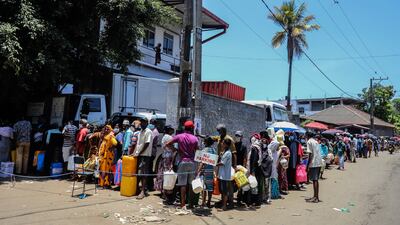Sri Lanka's government still has a majority in parliament and there is no consensus on who can replace the president and the prime minister despite protests against an economic crisis, its Foreign Ministry said on Thursday.
Sri Lanka has endured months of shortages of fuel and other essentials, with widespread criticism of President Gotabaya Rajapaksa intensifying after he refused to stand down.
Minister of Foreign Affairs G. L. Peiris made the claims as he briefed the diplomatic corps on Wednesday.
Long queues to buy fuel, food and medicines, most of which comes from abroad and is paid for in hard currency, have become commonplace throughout Sri Lanka.
Power cuts take place daily, often lasting for hours.
In Colombo on Thursday, residents were seen queuing for oil, which is in short supply.
"People are on the streets and no one understands our grief. People are queuing up with their little ones. No eating, no drinking. This is a cruel thing these rulers do," said Sara Kazim, a 70-year-old local resident.
Another local bus driver said that shortages of food and fuel were now acute.
"Without sleep I am here waiting in line ... 8am till dawn to fetch some oil and go to the village. Children have nothing to eat for the Sinhala New Year. Tears come to my eyes. I cannot express my sadness. All this we do to live. I'm not used to any job other than driving. That's why I parked my bus ... and struggle to get some oil,” Martin Perera told AP.
Mr Rajapaksa has resisted calls for his resignation – some of which came from members of his own coalition who said an interim government should replace him and failing to do so would make the current rulers responsible for violence.
On Wednesday, Mr Rajapaksa revoked the state of emergency that he had declared last week after crowds demonstrated near his home in the capital Colombo.
Protests continued on Thursday in many parts of the country demanding that Mr Rajapaksa step down.
The president had earlier proposed a unity government be formed to handle the crisis but this was rejected by the main opposition party.
His Cabinet resigned on Sunday night and on Tuesday, nearly 40 government politicians said they would no longer vote according to coalition instructions, significantly weakening his leadership.
The government estimates the Covid-19 pandemic has cost Sri Lanka's economy $14 billion.
The country’s reserves dropped 16.1 per cent to $1.93bn in March from a month earlier, the central bank said on its website on Thursday.












